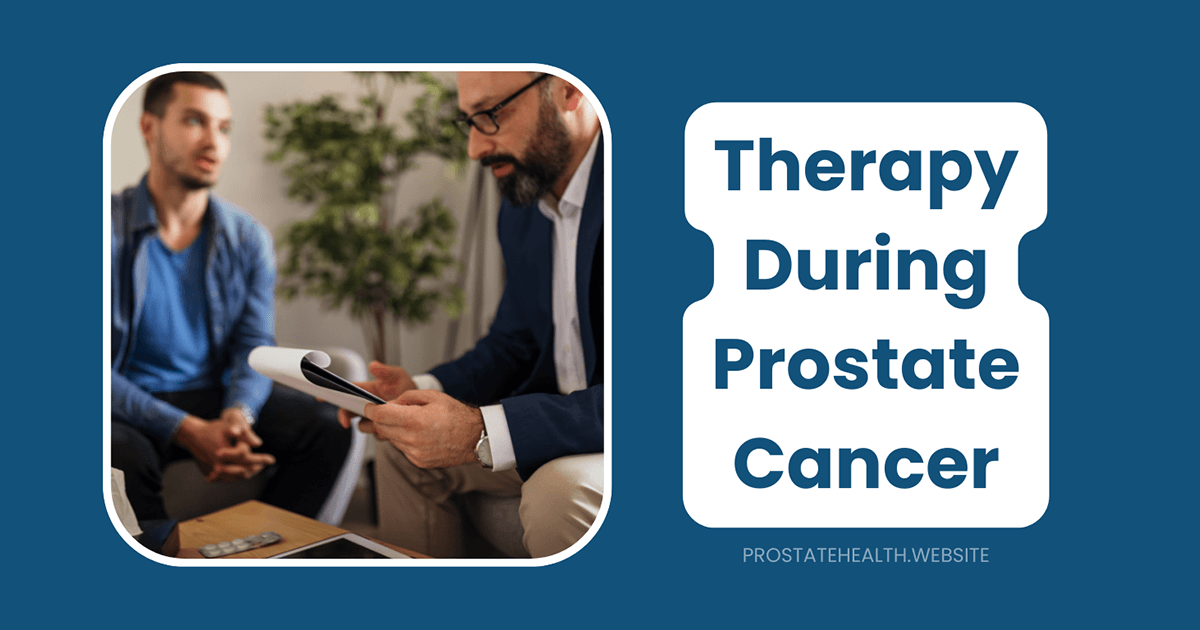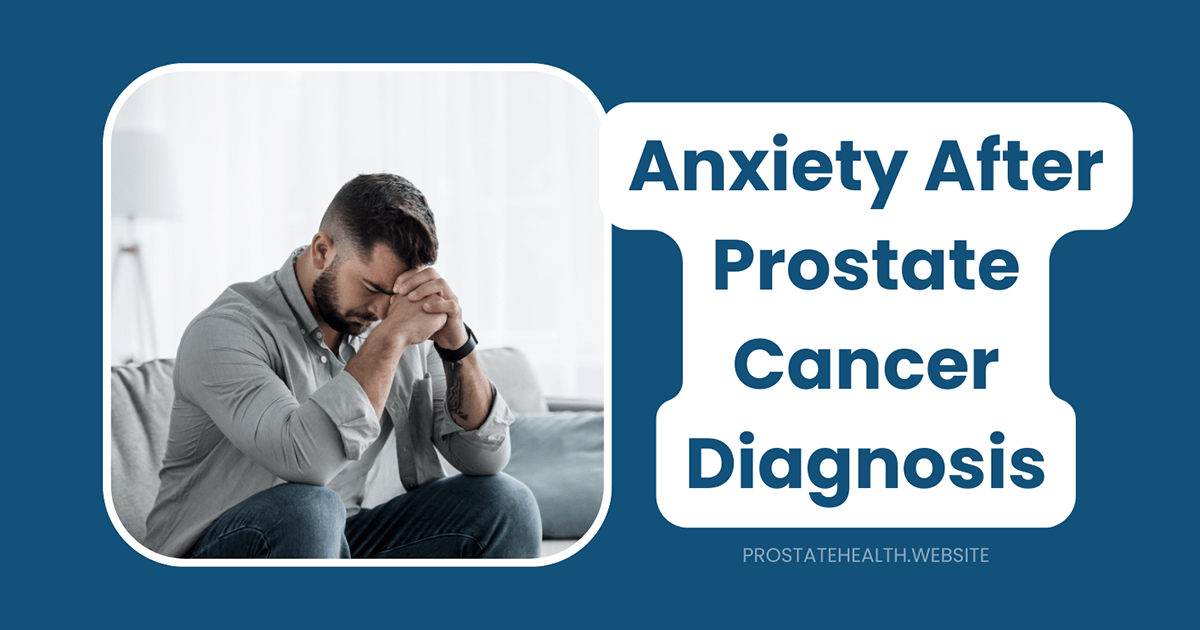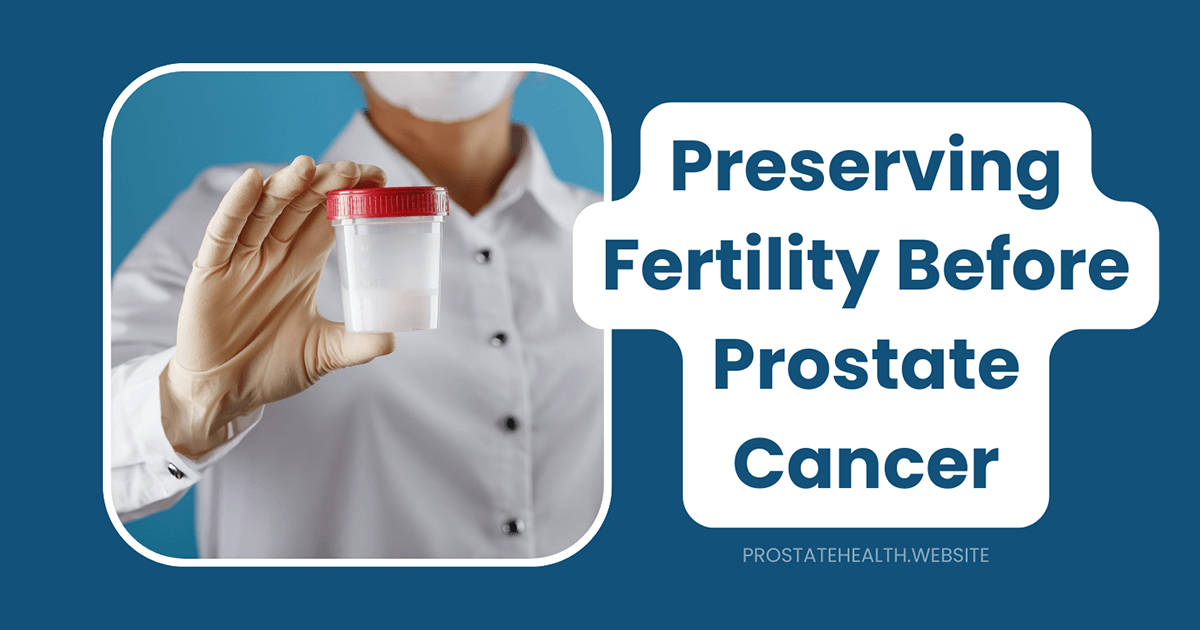The Role of Therapy in Prostate Cancer Recovery

When Mark, a 62-year-old construction manager, first heard his prostate cancer diagnosis, he did what many men do—he focused entirely on the physical battle ahead. Surgery schedules, treatment options, and recovery timelines filled his calendar and his thoughts.
“I was determined to beat this thing,” Mark told me. “I researched every medical detail, asked my doctors a million questions about the surgery, and created a strict physical recovery plan. But six months after treatment, even though I was healing physically, I felt like I was falling apart inside.”
Mark’s experience mirrors what research has consistently shown: the psychological impact of prostate cancer can be as significant as the physical challenges. Studies reveal that up to 25% of prostate cancer patients experience significant anxiety, and approximately 16% face clinical depression during their cancer journey. Perhaps most alarming, men with advanced prostate cancer have twice the suicide risk compared to age-matched males without cancer.
Yet the mental health aspect of prostate cancer recovery remains largely underdiscussed, with many men suffering in silence rather than seeking the psychological support that could dramatically improve their quality of life.
This article explores how therapy and psychological support can play a crucial role in prostate cancer recovery—not as an optional “extra,” but as an essential component of comprehensive cancer care that can significantly improve outcomes and quality of life.
The Psychological Impact of Prostate Cancer
Before discussing solutions, it’s important to understand the unique psychological challenges that prostate cancer presents:
Identity and Masculinity Challenges
For many men, prostate cancer strikes at the core of their identity. Treatment side effects like erectile dysfunction, incontinence, and body changes can challenge traditional notions of masculinity and self-image.
“I went from being the guy who never needed help to someone who had to wear pads for incontinence and couldn’t perform sexually,” explains James, 58. “It made me question who I was as a man.”
Relationship Strain
The impact extends beyond the individual to affect intimate relationships. Communication difficulties, changes in sexual function, and shifting roles can create significant relationship stress.
Research shows that partners of prostate cancer patients often experience levels of distress equal to or greater than the patients themselves, with up to 50% of caregivers reporting significant psychological distress.
Uncertainty and Fear
Living with the uncertainty of cancer recurrence creates a unique psychological burden. Many men describe the anxiety before each PSA test as overwhelming, affecting their sleep, concentration, and overall well-being.
Social Isolation
Men typically have smaller social support networks than women and may be less likely to share health concerns with friends. This tendency toward isolation can worsen during prostate cancer recovery.
As one support group member put it: “I could talk to my buddies about anything—sports, politics, work problems—but cancer? That conversation never happened.”
The Evidence for Psychological Support
The good news is that research consistently demonstrates the effectiveness of psychological interventions for men with prostate cancer:
Improved Quality of Life
A systematic review of psychological interventions for prostate cancer patients found that therapy significantly improves overall well-being after treatment. These benefits extend beyond mood to include better physical functioning, reduced fatigue, and improved social well-being.
Reduced Psychological Distress
A recent clinical trial of the Prostate Cancer Patient Empowerment Program (PC-PEP) found that men who received psychological support had 3.59 times lower odds of experiencing significant psychological distress compared to those receiving standard care alone.
Better Treatment Adherence
Men who receive psychological support show better adherence to medical treatments and follow-up care, potentially improving their long-term health outcomes.
Enhanced Relationship Satisfaction
Couples-based interventions have been shown to improve communication and relationship satisfaction for both patients and their partners, creating a stronger support system during recovery.
Improved Symptom Management
Psychological interventions can help men better manage treatment side effects like fatigue, sleep disturbances, and pain through evidence-based techniques.
Types of Therapy That Help Prostate Cancer Patients
Several therapeutic approaches have shown particular promise for men recovering from prostate cancer:
Cognitive Behavioral Therapy (CBT)
CBT is one of the most researched and effective approaches for prostate cancer patients. This practical, skills-based therapy helps men identify and change unhelpful thought patterns and behaviors.
CBT can be particularly effective for:
- Managing anxiety about cancer recurrence
- Addressing depression symptoms
- Improving sleep quality
- Developing coping strategies for treatment side effects
“CBT gave me tools to recognize when my thoughts were spiraling into worst-case scenarios,” says Robert, 65. “I learned to challenge those thoughts with evidence and redirect my focus. It’s like having a mental toolkit for when anxiety strikes.”
Couples Therapy
Given the significant impact of prostate cancer on relationships, couples-focused interventions can be particularly valuable. These approaches help couples:
- Improve communication about sensitive topics
- Adapt to changes in sexual intimacy
- Navigate shifting roles during recovery
- Process grief and loss together
- Strengthen their relationship despite challenges
Research shows that couples therapy benefits both the patient and partner, with improvements in relationship satisfaction, communication, and individual psychological well-being.
Supportive Group Therapy
Support groups led by trained facilitators offer a unique therapeutic environment where men can:
- Connect with others facing similar challenges
- Reduce feelings of isolation
- Learn practical coping strategies from peers
- Gain perspective on their own experience
- Develop a sense of community and belonging
“In my support group, I could finally talk about the things I couldn’t discuss with anyone else,” shares Thomas, 59. “Hearing other men talk openly about incontinence and erectile dysfunction made me feel less alone and gave me hope that I could get through this too.”
Mindfulness-Based Interventions
Mindfulness approaches, which focus on present-moment awareness and acceptance, have shown promising results for cancer patients, helping with:
- Stress reduction
- Improved sleep
- Better management of physical discomfort
- Reduced rumination about the future
- Greater overall well-being
Telehealth Options
Online therapy has become increasingly available and effective, offering:
- Convenience for men with mobility issues or busy schedules
- Privacy for those uncomfortable with in-person sessions
- Access to specialists regardless of location
- Flexibility in scheduling
The PC-PEP program mentioned earlier delivered psychological support entirely online and demonstrated significant benefits, suggesting that virtual interventions can be highly effective.
When to Consider Therapy
While psychological support can benefit any man with prostate cancer, certain situations may indicate a particular need for professional help:
Signs That Therapy Might Be Beneficial
- Persistent feelings of sadness, hopelessness, or emptiness
- Excessive worry or anxiety that interferes with daily activities
- Significant sleep disturbances
- Loss of interest in previously enjoyed activities
- Relationship difficulties related to cancer diagnosis or treatment
- Difficulty making treatment decisions due to emotional distress
- Thoughts of death or suicide
- Struggling to adjust to physical changes or limitations
- Feeling overwhelmed by uncertainty about the future
It’s important to note that seeking help isn’t a sign of weakness—it’s a proactive step toward comprehensive recovery. As one support group member put it: “Getting therapy after my prostate cancer was as important as my follow-up appointments with my urologist. One was healing my body; the other was healing my mind.”
Overcoming Barriers to Seeking Help
Despite the clear benefits, many men hesitate to seek psychological support. Understanding and addressing these barriers is crucial:
Common Barriers and How to Overcome Them
“I should be able to handle this on my own.”
This belief, rooted in traditional masculinity norms, prevents many men from seeking help. Consider reframing therapy as:
- A strategic tool for recovery, similar to physical therapy
- A way to gain skills and knowledge, not a sign of weakness
- Something strong men do to become even stronger
“I don’t want to talk about my feelings.”
Therapy for prostate cancer patients doesn’t have to focus exclusively on emotional expression. Many approaches are:
- Practical and skills-based
- Focused on specific problems and solutions
- Designed to improve function and quality of life
“I don’t have time for another appointment.”
Consider:
- Telehealth options that eliminate travel time
- Brief therapy approaches that focus on specific issues
- Integrating psychological support into existing medical appointments
“It’s too expensive.”
Explore:
- Insurance coverage (many plans now cover mental health services)
- Sliding scale fees offered by many providers
- Support groups, which are often free or low-cost
- University training clinics with reduced fees
- Employee assistance programs through your workplace
“I don’t know where to start.”
Begin with:
- Asking your oncologist or urologist for a referral
- Contacting cancer support organizations like ZERO or the Prostate Cancer Foundation
- Checking with your insurance provider for in-network therapists
- Using online directories that specialize in therapists experienced with cancer patients
Finding the Right Therapist
Not all therapists have experience working with prostate cancer patients. Here’s how to find someone with the right expertise:
Questions to Ask Potential Therapists
- What experience do you have working with cancer patients, particularly prostate cancer?
- What therapeutic approaches do you use for cancer-related psychological issues?
- How do you address concerns related to masculinity, sexual function, and body image?
- Do you have experience working with couples affected by cancer?
- What is your approach to helping patients manage uncertainty and fear of recurrence?
- How do you collaborate with medical providers?
Where to Look
- Cancer centers: Many comprehensive cancer centers have psycho-oncology departments with specialists in cancer-related psychological issues.
- Professional organizations: The American Psychosocial Oncology Society (APOS) and the American Psycho-Oncology Society maintain directories of qualified providers.
- Cancer support organizations: ZERO and the Prostate Cancer Foundation can provide referrals to mental health professionals experienced with prostate cancer.
- Your healthcare team: Oncologists, urologists, and nurses often know qualified therapists who work with cancer patients.
Partners and Family: The Ripple Effect
The psychological impact of prostate cancer extends beyond the patient to affect partners and family members. Research shows that partners often experience levels of distress equal to or greater than patients themselves.
Support for Partners
Partners benefit from:
- Their own individual therapy to process emotions and develop coping strategies
- Couples therapy to address relationship changes and communication challenges
- Support groups specifically for partners of cancer patients
- Education about prostate cancer and its psychological effects
As Maria, whose husband underwent prostate cancer treatment, shares: “I was so focused on being strong for him that I neglected my own emotional needs. Individual therapy gave me a place to express my fears and frustrations without burdening him, which ultimately made me a better support person.”
Family Therapy
When appropriate, involving adult children or other family members in therapy can:
- Improve family communication about cancer
- Help family members understand how to provide effective support
- Address changes in family roles and responsibilities
- Create a unified approach to supporting recovery
Integrating Psychological Care with Medical Treatment
The most effective approach to prostate cancer recovery integrates psychological care with medical treatment:
Collaborative Care Models
In ideal scenarios:
- Mental health professionals work directly with oncology teams
- Psychological assessments are part of routine cancer care
- Therapy addresses both cancer-specific concerns and general psychological well-being
- Communication between providers ensures comprehensive care
What to Ask Your Medical Team
- Does your practice or cancer center offer psychological support services?
- Can you refer me to a mental health professional experienced with prostate cancer patients?
- How do you address the psychological aspects of prostate cancer recovery?
- Would you be willing to communicate with my therapist about my treatment?
Success Stories: Therapy as a Turning Point
Many men describe therapy as a turning point in their prostate cancer journey:
“After my prostatectomy, I was depressed about the erectile dysfunction and incontinence. I felt like less of a man. Therapy helped me see that my worth wasn’t tied to these functions. I learned to focus on what I could still do and enjoy rather than what I had lost. Three years later, I can honestly say I’m happier and more at peace than I was even before cancer.” — James, 64
“The couples therapy my wife and I did during my cancer treatment saved our marriage. We learned to talk about difficult topics we’d always avoided, like our sexual relationship and our fears about the future. Cancer became the catalyst for a deeper, more honest relationship than we’d ever had in our 30 years together.” — Robert, 67
“Group therapy with other prostate cancer survivors gave me something my doctors couldn’t—the wisdom of men who had walked this path before me. Their practical advice about managing side effects and their emotional support during my darkest moments was invaluable. I still meet with the group five years after my treatment.” — Michael, 59
Taking the First Step
If you’re considering therapy as part of your prostate cancer recovery, here are some concrete first steps:
- Talk to your healthcare team: Ask your oncologist or urologist for a referral to a mental health professional experienced with cancer patients.
- Contact cancer support organizations: Reach out to ZERO (1-844-244-1309) or the Prostate Cancer Foundation for resources and referrals.
- Explore online options: Consider telehealth platforms that specialize in cancer support if in-person options are limited in your area.
- Start with a support group: If individual therapy feels too intimidating, a support group can be an excellent entry point to psychological support.
- Include your partner: Consider whether couples therapy might benefit both of you during this journey.
Remember that seeking help isn’t a sign of weakness—it’s a strategic decision to optimize your recovery and quality of life. As one support group member put it: “Getting therapy was the strongest thing I did during my cancer journey. It took more courage than surgery.”
Resources to Get Started
Organizations Offering Support
- ZERO – The End of Prostate Cancer: Offers a helpline, support groups, and resources for finding mental health support
- Prostate Cancer Foundation: Provides educational resources and support services
- American Cancer Society: Offers information on coping with cancer and finding support
Books That Help
- “Man to Man: Surviving Prostate Cancer” by Michael Korda
- “Promoting Wellness for Prostate Cancer Patients” by Mark A. Moyad
- “The Whole Male: Coping with Prostate Cancer” by Robert Hicks
Online Support Communities
- Us TOO International: Offers virtual support groups and resources
- Cancer Support Community: Provides online support groups and educational resources
- Malecare: Offers support specifically for men with prostate cancer
A Personal Note: The Courage to Seek Help
As someone who has both experienced prostate cancer and worked with hundreds of men navigating this journey, I’ve seen firsthand how transformative psychological support can be. The men who thrive after prostate cancer aren’t necessarily those with the most favorable diagnoses or the fewest side effects—they’re the ones who address both the physical and psychological aspects of recovery.
Seeking therapy takes courage—perhaps even more courage than facing surgery or radiation. It requires acknowledging vulnerability, being willing to explore difficult emotions, and sometimes challenging long-held beliefs about masculinity and self-reliance.
But the men I’ve worked with consistently describe therapy as one of the most valuable components of their recovery journey. Many say it not only helped them cope with cancer but led to personal growth and insights that improved their lives in unexpected ways.
As Mark, whom we met at the beginning of this article, reflected after six months of therapy: “Cancer changed my body in ways I couldn’t control. But therapy changed my mind in ways I chose. And ultimately, that made all the difference in my recovery.”
Have you incorporated therapy or psychological support into your prostate cancer journey? What was your experience? Share in the comments below to help other men considering this important aspect of recovery.






